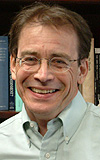Professor Paul Haagen chairs Student-Athlete Counseling Committee

Of the thousands who are familiar with names like Grant Hill, Cherokee Parks, and Shane Battier, relatively few actually know them beyond their performance on the basketball court. Paul Haagen, Professor at Duke Law School, knows them and many others as the chair of Duke University's Student-Athlete Counseling Committee.
Having received degrees from Haverford College, Oxford University, Princeton University and Yale Law School, Haagen's achievements distinguish him in the world of academia. However, it was his lack of experience in the sports world that made him such an appealing addition to the committee in 1990.
"I was teaching contracts and had no connection to the Athletic Department," said Haagen. "This is probably why I was good for the job."
The Committee is Duke's system for advising students transitioning from collegiate to professional athletics. It provides athletes the tools they need to select an agent, and teaches techniques that allow the athlete more control, input and a greater ability to make decisions to best advance their careers.
"These people (athletes) have the potential to both mess up and to also make very positive advancements for themselves," said Haagen. "I try to get them to think about what they are trying to accomplish and how to get there."
Lon Babby, practice leader of law firm Williams and Connolly's athletics division in Washington D.C., first met Haagen while representing Grant Hill. He has since represented Duke athletes Shane Battier, Christian Laettner and Cherokee Parks, and attests to the value of Haagen's guidance for athletes.
Through his work, Babby is able to compare Duke's transitional program to that of other universities. He says, "It is the best in the country and is the most sophisticated and helpful process in the country. "It gives them (athletes) a good process for getting representation."
When it comes to transitioning athletes from college to professional sports, Duke distinguishes itself by an expansive advising system. Haagen said no other ACC school actively uses resources beyond the Athletic Department. At Duke, Haagen said, the athlete's ability to shape his/her own career is what makes the program stand out from all the rest.
"I've been told there are a number of schools that have professional sports counseling committees, but that these committees are ‘procedural' rather than ‘substantive,'" Haagen said. "My understanding of the distinction…is that most committees merely attempt to get agents to meet certain minimal registration requirements, but do not attempt any serious counseling of athletes."
Haagen's work with Student-Athlete Counseling Committee is largely responsible for one of the most common praises of Duke's agent-selection process. Athletes are pleased they can retain control over the procedure and like that they may include family, friends, coaches and others in the selection process.
Janet Hill, mother of basketball icon Grant Hill, said her son's transition between Duke and the NBA was a smooth one because of Haagen's influence and the unique opportunity Duke offers its athletes to be in command of their futures. Hill said that when her son was 21, he had a romanticized view of the professional life, but Haagen's advice and Duke's polished agent-selection method forced him to become more mature about his future.
Hill said Haagen helped her son understand the professional world, including the financial realities that follow the NBA draft. The immediate influx of money that occurs once a contract has been signed with a professional team can easily shock many 20-something athletes, and can cause some to forget that continual work and training is required to maintain professional status.
"The challenge for Paul Haagen is how to get this message across to a young 20-year-old," said Hill. "You still have to work hard to keep earning the paycheck."
One of the most critical steps for Grant Hill when he was entered the professional world was realizing where the control lay in the athlete-agent relationship. "Grant has never forgotten that his lawyers and agents work for him," said Hill. "Paul tries to enforce that with the athletes."
Since the committee's inception students have sought varying levels of assistance from Haagen. Some students seek little help from the committee, some rely very heavily on its support and advice, and others have been able to utilize its benefits in a general, less intimate manner.
Haagen said that with the Student-Athlete Counseling Committee, there is no single path to a smooth transition to professional athletics. Rather than forcing athletes to fully employ the advising system, the committee can be tailored to fit an athlete's strengths and weaknesses. Thus, many of Duke's top athletes have successfully used the committee's assistance in different ways.
"They are often uncertain about how much they can and should trust us," Haagen said. "But, once we instill that trust, I think we have made a significant difference for them."
This article was written by Duke University junior Lauren Carpenter.